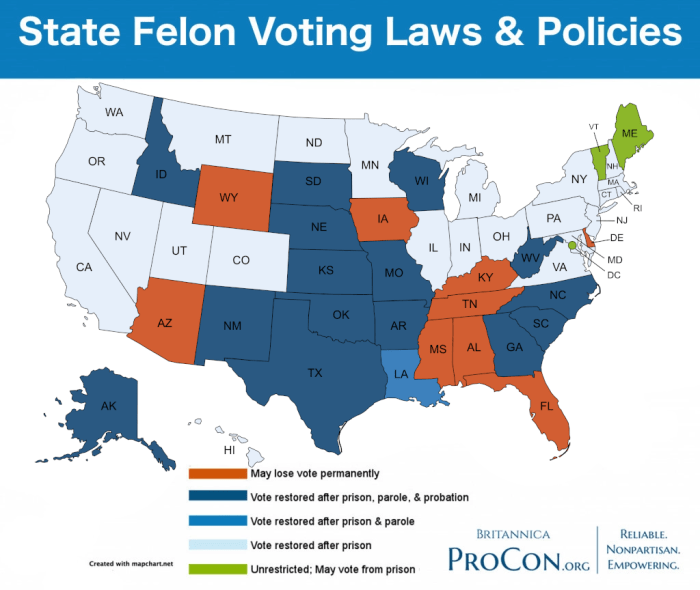Can felons vote in maryland – In Maryland, the topic of felon voting rights is a multifaceted issue that raises questions about justice, rehabilitation, and the right to participate in our democracy. This article delves into the complex legal landscape and social implications surrounding felon disenfranchisement in the state, examining the laws, eligibility requirements, and the ongoing debate about restoring voting rights to those who have served their time.
Maryland’s felon voting laws have evolved over time, and the current legal framework reflects a balance between public safety concerns and the belief in redemption and second chances. Understanding the nuances of these laws and their impact on individuals and communities is crucial for informed discussions about voting rights and social justice.
Maryland Felony Voting Laws

Maryland’s felon voting laws have undergone significant changes over the years. In 1867, the state constitution was amended to disenfranchise individuals convicted of “infamous crimes,” which included felonies. This disenfranchisement remained in place until 2007, when a constitutional amendment was passed to restore voting rights to individuals who had completed their sentences, including parole and probation.
Recent Changes
In 2018, Maryland passed a law that expanded voting rights to individuals who are currently incarcerated. This law allows individuals who are serving sentences in local jails or detention centers to register and vote in elections. The law also provides for the establishment of polling places within correctional facilities.
Can felons vote in Maryland? The answer is yes, but there are some restrictions. If you’re looking for more information on this topic, check out the pdf saxon math course 1 . It provides a comprehensive overview of the voting rights of felons in Maryland.
Proposed Changes
There are currently several proposed changes to Maryland’s felon voting laws. One proposal would restore voting rights to individuals who are on probation or parole for nonviolent offenses. Another proposal would allow individuals who are serving life sentences to vote.
These proposals are currently being considered by the Maryland General Assembly.
Eligibility and Restrictions
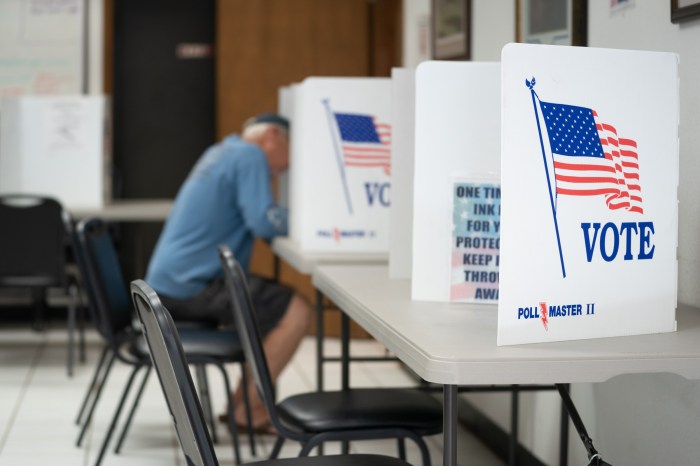
Under Maryland law, a felon is an individual convicted of a felony offense, which is defined as a crime punishable by imprisonment for more than one year. Not all felonies result in the loss of voting rights in Maryland.
Specific Felonies Resulting in Loss of Voting Rights, Can felons vote in maryland
In Maryland, only certain felonies result in the loss of voting rights. These include:
- Murder
- Rape
- Arson
- Burglary
- Robbery
- Kidnapping
- Distribution of controlled substances
- Perjury
- Bribery
- Election fraud
Restoring Voting Rights
Individuals who have completed their felony sentence may have their voting rights restored through two methods:
Automatic Restoration
Voting rights are automatically restored for most felonies after completion of the sentence, including probation and parole.
Gubernatorial Restoration
Individuals convicted of specific felonies, such as murder, rape, or child sexual abuse, must apply to the Governor for restoration of voting rights. The Governor has the discretion to grant or deny the application based on factors such as the severity of the crime and the individual’s rehabilitation.
Impact on Voting Patterns
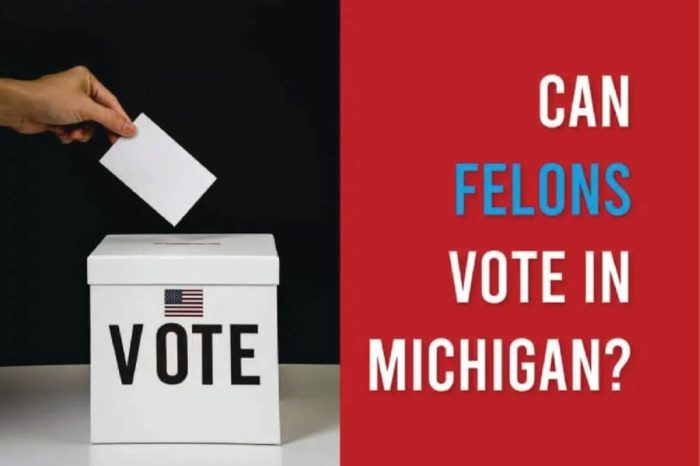
Felon disenfranchisement laws have a significant impact on voter turnout in Maryland. Studies have shown that areas with high concentrations of felons have lower voter turnout rates compared to areas with low concentrations of felons.
One study found that in the 2016 election, voter turnout in Maryland counties with the highest rates of felon disenfranchisement was 10% lower than in counties with the lowest rates of felon disenfranchisement.
Potential Effects of Restoring Voting Rights to Felons on Election Outcomes
Restoring voting rights to felons could have a significant impact on election outcomes in Maryland. In the 2016 election, an estimated 40,000 felons were disenfranchised in Maryland. If these felons had been allowed to vote, they could have swung the election in several close races.
For example, in the 2016 gubernatorial election, the margin of victory was less than 10,000 votes. If the 40,000 disenfranchised felons had been allowed to vote, they could have easily changed the outcome of the election.
Social and Economic Implications
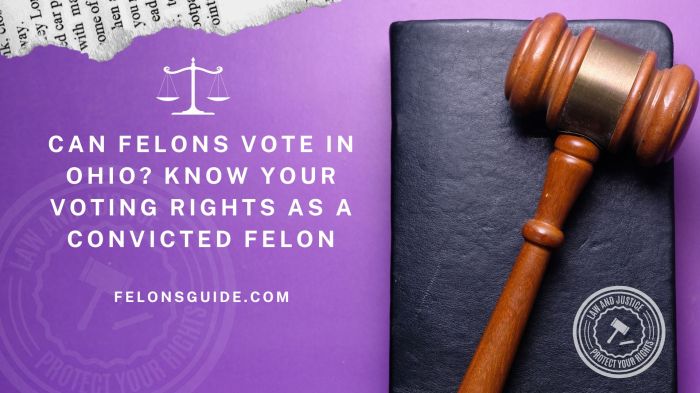
Felon disenfranchisement has far-reaching consequences beyond the individual. It perpetuates social and economic inequalities, hindering the reintegration of formerly incarcerated individuals into society.The loss of voting rights impacts employment prospects. Employers often screen job applicants for criminal records, and a felony conviction can significantly reduce one’s chances of securing gainful employment.
This perpetuates a cycle of poverty and unemployment, as individuals without a stable income are more likely to engage in criminal activity.Housing is another area where felon disenfranchisement has a negative impact. Many landlords refuse to rent to individuals with criminal records, making it difficult for formerly incarcerated people to find stable housing.
This lack of access to adequate housing can contribute to homelessness, poverty, and recidivism.Furthermore, felon disenfranchisement undermines community involvement. When individuals are denied the right to vote, they feel marginalized and disconnected from the political process. This can lead to distrust in government and a reluctance to engage in civic activities, further perpetuating social isolation and disenfranchisement.
Benefits of Restoring Voting Rights
Restoring voting rights to felons has numerous potential benefits. It can help to reduce recidivism by giving formerly incarcerated individuals a sense of purpose and belonging. It can also promote social cohesion by fostering a sense of shared responsibility and reducing stigma.
Additionally, restoring voting rights can contribute to a more representative and inclusive democracy, ensuring that all voices are heard in the political process.
Legal Challenges and Controversies: Can Felons Vote In Maryland
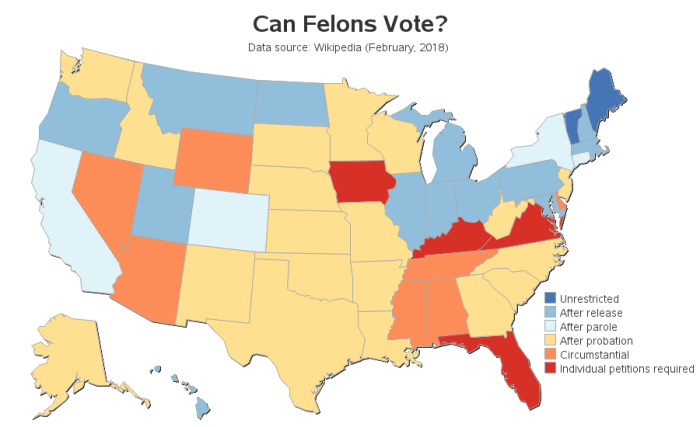
Maryland’s felon voting laws have faced numerous legal challenges, with varying outcomes. These challenges have centered on the constitutionality of disenfranchising felons, particularly in light of the Supreme Court’s ruling in Bush v. Gore(2000), which held that felon disenfranchisement laws must be narrowly tailored to serve a compelling governmental interest.
Arguments for Felon Disenfranchisement
- Felons have violated the law and should not be allowed to participate in the political process until they have completed their sentence and proven themselves to be rehabilitated.
- Felony convictions indicate a lack of judgment and responsibility, making felons unfit to make decisions about who should govern them.
- Disenfranchisement serves as a deterrent to crime by making potential criminals aware that they will lose their voting rights if they commit a felony.
Arguments Against Felon Disenfranchisement
- Disenfranchisement is a form of discrimination that disproportionately affects people of color, who are more likely to be convicted of felonies.
- Felony disenfranchisement laws are not narrowly tailored to serve a compelling governmental interest, as they do not consider the individual circumstances of each felon.
- Disenfranchisement undermines the democratic process by silencing the voices of a significant portion of the population.
Potential Outcomes of Ongoing Legal Battles
The outcome of ongoing legal battles over Maryland’s felon voting laws is uncertain. However, several possible outcomes exist:
- The courts could uphold the constitutionality of Maryland’s felon voting laws, allowing them to remain in place.
- The courts could strike down the laws as unconstitutional, requiring Maryland to revise its felon voting policies.
- The courts could issue a more nuanced ruling, allowing for some felons to regain their voting rights while upholding disenfranchisement for others.
Top FAQs
Can all felons vote in Maryland?
No, certain felonies, such as murder and violent crimes, result in permanent loss of voting rights.
How can felons restore their voting rights in Maryland?
Individuals who have completed their felony sentence and are not serving probation or parole can apply to have their voting rights restored through a process known as clemency.
What are the arguments in favor of felon disenfranchisement?
Proponents argue that felons should not have the right to vote because they have committed serious crimes and may not be trustworthy or responsible enough to participate in the political process.
What are the arguments against felon disenfranchisement?
Opponents argue that disenfranchisement perpetuates a cycle of poverty and recidivism, and that it is a form of punishment that extends beyond the completion of a sentence.
